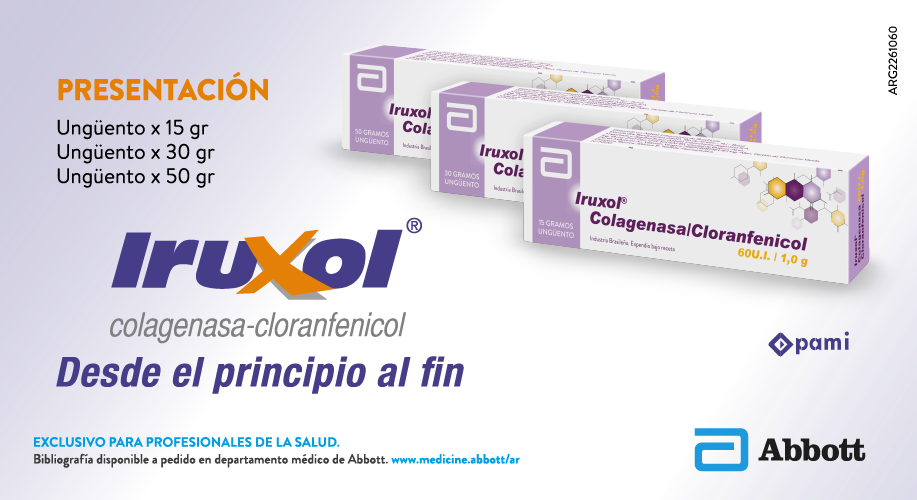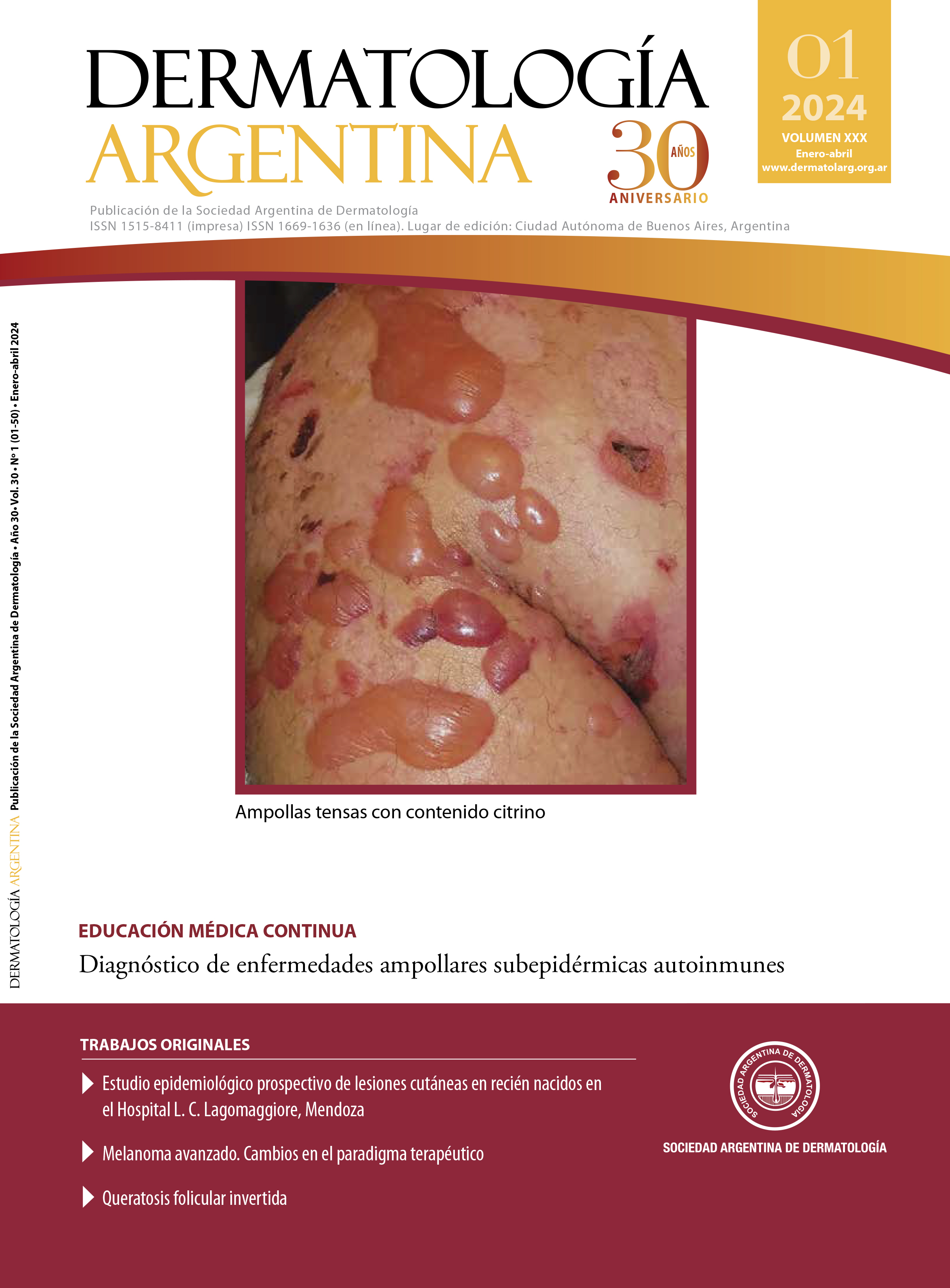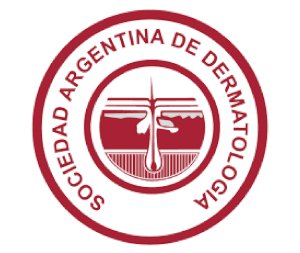Advanced melanoma. Changes in the therapeutic paradigm
DOI:
https://doi.org/10.47196/da.v30i1.2472Keywords:
melanoma, treatment, immunotherapy, pembrolizumab-nivolumabAbstract
Introduction: cancer melanoma has increased its incidence in the last decades. Its treatment is still a challenge. The advent of target therapies and immunotherapies have changed its prognosis. Within immune therapy, anti-PD1, have shown auspicious outcomes in patient´s survival.
Objectives: to establish the population characteristics of the patients in our hospital and compare our experience in the treatment of advance melanoma with immunotherapy with existing globally data.
Design: a retrospective, descriptive and cross- sectional study was carried out.
Materials and methods: 158 patients were diagnosed with melanoma. Advanced stages (IIIc and IV) were observed in 54 patients. Of these 18 (33%) received immune therapy. 22% received pembrolizumab and 78% nivolumanb, both as monotherapy. BRAF mutation was disclosed in 39% of the cases. 56% of these patients had a favorable response, 44% had a complete response and an improvement in the ECOG score at the end of the treatment in relation to those who did not respond. Overall survival at one year was 55%.
Conclusions: advanced melanoma cancer is still a therapeutic challenge. The use of immune therapy demonstrated high survival rates. In our professional experience, positive outcomes were observed with immunotherapy with overall survival results similar to those reported globally.
References
I. Campaña Nacional de Cáncer de Piel. Sociedad Argentina de Dermatología; 2016. Estadísticas. Disponible en: cancerdepiel.org.ar/prensa/CDP2016_Estadisticasramc.pdf [Consultado agosto 2023].
II. da Silveira Nogueira Lima JP, Georgieva M, Haaland B, de Lima Lopes G. A systematic review and network meta-analysis of immunotherapy and targeted therapy for advanced melanoma. Cancer Med. 2017;6:1143-1153.
III. Luke JJ, Flaherty KT, Ribas A, Long GV. Targeted agents and immunotherapies: optimizing outcomes in melanoma. Nat Rev Clin Oncol. 2017;14:463-482.
IV. Jenkins R, Fisher D. Treatment of advanced melanoma in 2020 and beyond. J Invest Dermatol. 2021;141:23-31.
V. ANMAT. Boletín de disposiciones. Disposición N° 1935. Disponible en: http://www.anmat.gov.ar/boletin_anmat/febrero_2016/Dispo_1935-16.pdf [Consultado octubre 2023].
VI. Jin C, Zhang X, Zhao K, Xu J, et ál. The efficacy and safety of nivolumab in the treatment of advanced melanoma: a meta-analysis of clinical trials. Onco Targets Ther. 2016 Mar 16;9:1571-1578.
VII. Rosés-Gibert P, Podlipnik S, de la Torre Gomar FJ, Saenz-Aguirre A, et ál. Estudio descriptivo de los pacientes diagnosticados de melanoma en la provincia de Álava entre los años 2015 y 2018. Actas Dermosifiliogr. 2022;113:178-182.
VIII. Amarillo D, De Boni D, Nantes F, Tambasco C, et ál. Melanoma cutáneo en Uruguay. Rev Med Urug. 2020;36:146-154.
IX. Montes MV, Fouces B, Valdez R, de Diego MC, et ál. Comparación epidemiológica de los melanomas cutáneos diagnosticados en dos períodos en el Hospital Universitario Austral. Dermatol Argent. 2023;29:10-16.
X. Tejera-Vaquerizo A, Barrera-Vigo MV, Fernández-Canedo I, Blázquez-Sánchez N, et ál. Estudio temporal de los diferentes patrones metastásicos en la progresión del melanoma cutáneo. Actas Dermosifiliogr. 2007;98:531-538.
XI. Catalano H, Faillo A, Jolly H, Lifschitz E. Pembrolizumab en primera línea para melanoma avanzado, metastásico o irresecable, sin mutación BRAF. Buenos Aires, Argentina: Ministerio de Salud, Mar 2021. Disponible en: https://www.argentina.gob.ar/sites/default/files/informe-13-pembrolizumab_0.pdf [Consultado octubre 2023].
XII. Force J, Salama A. First line treatment of metastatic melanoma: role of nivolumab. Immunotargets Ther. 2017;13:1-10.
XIII. Schachter J, Ribas A, Long GV, Arance A, et ál. Pembrolizumab versus ipilimumab for advanced melanoma: final overall survival results of a multicentre, randomised, open-label phase 3 study (KEYNOTE - 006). Lancet. 2017;390:1853-1862.
XIV. Davies M. Is it safe to stop anti PD-1 immunotherapy in patients with metastatic melanoma who achieve a complete response? J Clin Oncol. 2020;38:1645-1647.
XV. Duarte C, López H. Melanoma acral lentiginoso, revisión bibliográfica. Rev Colomb Cir. 2014;29:155-166.
XVI. Ballester-Sánchez R, de Unamuno-Bustos B, Navarro-Mira B, Botella-Estrada R. Actualización en melanoma mucoso. Actas Dermosifiliogr. 2015;106:96-103.
XVII. Thompson J, Schneider B, Brahmer J, Achufusi A, et ál. Management of immunotherapy related toxicities, version 1.2022, NCCN Clinical Practice Guidelines in Oncology. J Natl Compr Canc Netw. 2022;20:387-405.
XVIII. Hannen JBAG, Carbonnel F, Robert C, Kerret KM, et ál. Management of toxicities from immunotherapy: ESMO Clinical Practice Guidelines for diagnosis, treatment and follow-up. Ann Oncol. 2017;28:119-142.
XIX. Bradish J, Cheng L. Molecular pathology of malignant melanoma: changing the clinical practice paradigm toward a personalized approach. Hum Pathol. 2014;45:1315-1326
Downloads
Published
Issue
Section
License
Copyright (c) 2024 Argentine Society of Dermatology

This work is licensed under a Creative Commons Attribution-NonCommercial-NoDerivatives 4.0 International License.
El/los autor/es tranfieren todos los derechos de autor del manuscrito arriba mencionado a Dermatología Argentina en el caso de que el trabajo sea publicado. El/los autor/es declaran que el artículo es original, que no infringe ningún derecho de propiedad intelectual u otros derechos de terceros, que no se encuentra bajo consideración de otra revista y que no ha sido previamente publicado.
Le solicitamos haga click aquí para imprimir, firmar y enviar por correo postal la transferencia de los derechos de autor














